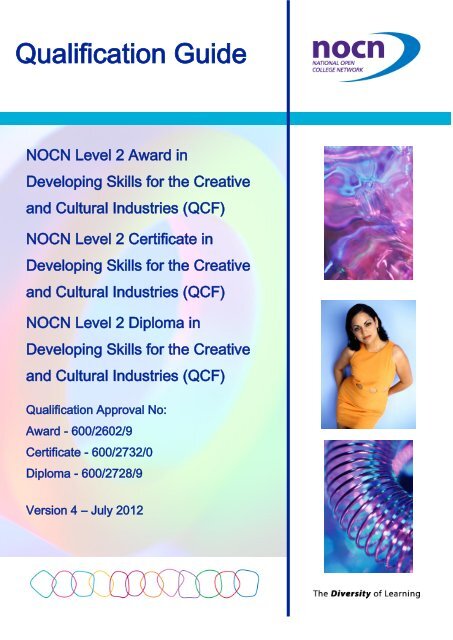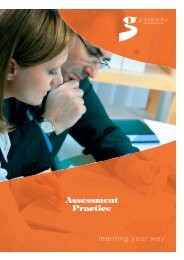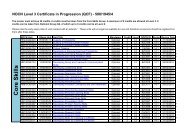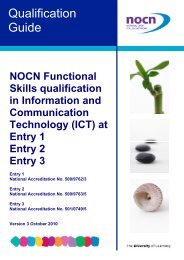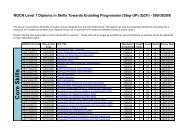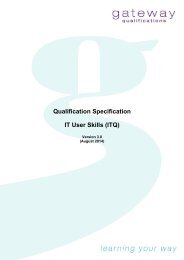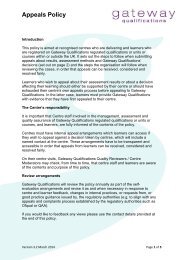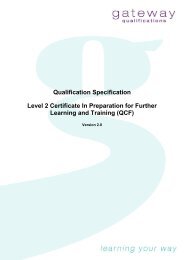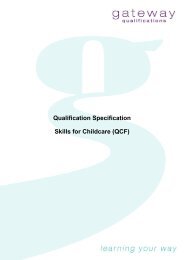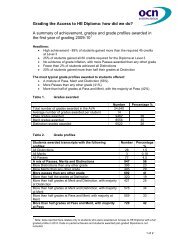Level 2 Qualification Guide - OCN Eastern Region
Level 2 Qualification Guide - OCN Eastern Region
Level 2 Qualification Guide - OCN Eastern Region
You also want an ePaper? Increase the reach of your titles
YUMPU automatically turns print PDFs into web optimized ePapers that Google loves.
<strong>Qualification</strong> <strong>Guide</strong>N<strong>OCN</strong> <strong>Level</strong> 2 Award inDeveloping Skills for the Creativeand Cultural Industries (QCF)N<strong>OCN</strong> <strong>Level</strong> 2 Certificate inDeveloping Skills for the Creativeand Cultural Industries (QCF)N<strong>OCN</strong> <strong>Level</strong> 2 Diploma inDeveloping Skills for the Creativeand Cultural Industries (QCF)<strong>Qualification</strong> Approval No:Award - 600/2602/9Certificate - 600/2732/0Diploma - 600/2728/9Version 4 – July 20121
N<strong>OCN</strong> <strong>Level</strong> 2 Award in Developing Skills for the Creativeand Cultural Industries (QCF)N<strong>OCN</strong> <strong>Level</strong> 2 Certificate in Developing Skills for the Creativeand Cultural Industries (QCF)N<strong>OCN</strong> <strong>Level</strong> 2 Diploma in Developing Skills for the Creativeand Cultural Industries (QCF)National Open College NetworkNational Open College Network (N<strong>OCN</strong>) is a leading credit-based Awarding Organisation in theUK, offering high quality, flexible, credit-based qualifications and is recognised by the<strong>Qualification</strong>s Regulators in England, Wales, Northern Ireland and Scotland. We also havepartnerships with <strong>OCN</strong>s in Scandinavia.N<strong>OCN</strong> had the second highest number of achievements in the QCF in 2009-2010, within the UK(Regulators’ Annual <strong>Qualification</strong>s Market Report Version 2 – August 2011 Ofqual/11/4854).We are a not for profit organisation and invest our resources into the development of existingproducts and services and new qualifications. We are proud to be a registered charity and willcontinue to promote our charitable objectives.There are more than 2,500 centres nationally offering N<strong>OCN</strong> qualifications. We currently havenearly 300 qualifications on both the National <strong>Qualification</strong> Framework (NQF) and the<strong>Qualification</strong>s and Credit Framework (QCF). They are made up of more than 1,000 units from awide range of areas including modern languages, trade unions, creative arts and design,foundations for learning and life, preparation for work including employability, security, creditcontrol and Offender Learning.We offer different types of qualifications from Entry <strong>Level</strong> to <strong>Level</strong> 4 and skills for life such asFunctional Skills. N<strong>OCN</strong> qualifications are delivered through schools, further education andsixth form colleges, higher education institutions, trade unions, employers, local educationauthorities and training organisations, adult and community education centres, and voluntaryand community organisations. We operate through a network of regional <strong>OCN</strong>s in England andNorthern Ireland.We work in collaboration with Agored Cymru, the Awarding Organisation for Wales. All <strong>OCN</strong>ssupport the delivery of N<strong>OCN</strong> qualifications, through N<strong>OCN</strong> recognised centres.2
N<strong>OCN</strong> <strong>Level</strong> 2 Award in Developing Skills for the Creativeand Cultural Industries (QCF)N<strong>OCN</strong> <strong>Level</strong> 2 Certificate in Developing Skills for the Creativeand Cultural Industries (QCF)N<strong>OCN</strong> <strong>Level</strong> 2 Diploma in Developing Skills for the Creativeand Cultural Industries (QCF)Contents1. About the qualifications........................................................................ 42. Who the qualifications are for .............................................................. 83. Achieving the qualifications ............................................................... 124. The qualification units ........................................................................ 175. How the qualifications are assessed ............................................... 3226. Offering the qualifications ................................................................ 3447. Quality Assurance and National Standardisation ............................... 353
N<strong>OCN</strong> <strong>Level</strong> 2 Award in Developing Skills for the Creativeand Cultural Industries (QCF)N<strong>OCN</strong> <strong>Level</strong> 2 Certificate in Developing Skills for the Creativeand Cultural Industries (QCF)N<strong>OCN</strong> <strong>Level</strong> 2 Diploma in Developing Skills for the Creativeand Cultural Industries (QCF)1. About the qualificationsThe qualifications have been designed to be flexible and enable access to a broad range oflearning across the Creative and Cultural sector. They have been designed to allow for both thedevelopment of generic skills and then to supplement these with specific learning for theendorsed routes.The N<strong>OCN</strong> Developing Skills for the Creative and Cultural Industries (QCF) suite ofqualifications aims to develop confidence in an individual’s creative abilities, develop technicalskills and knowledge through the use of a variety of techniques, processes and media withsupport and guidance, explore ideas and issues, offer opportunities for valuing different ideasand contributions from others, develop an understanding and awareness of the contribution ofthe arts to culture and society and make connections between their own work and that of others.The qualifications aim to prepare potential new entrants with the knowledge, understanding andan introduction to the skills needed to make a relevant contribution, or to pursue higher levelstudy. They combine practical and hands-on experience together with knowledge andunderstanding of the theoretical basis of the area. The delivery of the units prepares andprogresses the learners by providing a practical introduction and ensures their readiness foremployment or further study and training.These first step qualifications provide a platform to progression. The qualifications will enablethe development of generic transferable skills, which will enable learners to progress into arange of possible employment opportunities within specific areas of the arts and/or crafts.The qualifications will widen participation by offering diverse and flexible learning opportunitiesthrough which people can develop basic skills, knowledge and understanding to broadenprogression opportunities. They are first step qualifications, supporting government strategy toraise achievement and increase the capacity of individuals in society and in the workplace. Thequalifications provide the initial steps for individuals to utilise their interest in the arts to provide aroute to higher level qualifications and may assist in the achievement of basic and/or key skillsthrough the medium of the arts.4
N<strong>OCN</strong> <strong>Level</strong> 2 Award in Developing Skills for the Creativeand Cultural Industries (QCF)N<strong>OCN</strong> <strong>Level</strong> 2 Certificate in Developing Skills for the Creativeand Cultural Industries (QCF)N<strong>OCN</strong> <strong>Level</strong> 2 Diploma in Developing Skills for the Creativeand Cultural Industries (QCF)The specific aims of the qualifications are to:Develop confidence in an individual’s creative abilitiesDevelop technical skills and knowledge through the use of a variety of techniques,processes and media with support and guidanceExplore ideas and issuesOffer opportunities for valuing different ideas and contributions from othersDevelop a basic understanding and awareness of the contribution of the arts to cultureand societyMake connections between own work and that of others.Benefits for LearnersNationally recognised qualifications<strong>Qualification</strong>s that prepare learners for a career in the creative and cultural sector<strong>Qualification</strong>s that enable exploration of different career routes within the industry, andthus to identify suitable opportunities<strong>Qualification</strong>s that give flexibility and choice to explore different career and businessoptions<strong>Qualification</strong>s that give flexibility in meeting individual learner needsProgression on to other learning and qualifications within the QCF.Benefits for Centres<strong>Qualification</strong>s that are accredited by the regulatory authorities and nationally recognisedQuality assurance and support from an Open College Network (<strong>OCN</strong>)Progression routes into other qualification provision offered by the CentreFlexibility in approaches to delivery and assessment that, in turn, facilitates innovativeand learner-centred practiceA mandatory unit plus a choice of optional units which allow Centres flexibility to providea course that meets the particular needs of target learnersNo upper age limit to allow the accumulation of credit over time.5
N<strong>OCN</strong> <strong>Level</strong> 2 Award in Developing Skills for the Creative and Cultural Industries (QCF)N<strong>OCN</strong> <strong>Level</strong> 2 Certificate in Developing Skills for the Creative and Cultural Industries (QCF)N<strong>OCN</strong> <strong>Level</strong> 2 Diploma in Developing Skills for the Creative and Cultural Industries (QCF)The qualifications available at <strong>Level</strong> 2 in this suite are listed below:AccreditedCredit<strong>Qualification</strong> TitleNumberValueGLH600/2602/9 N<strong>OCN</strong> <strong>Level</strong> 2 Award in Developing Skills for the Creative and Cultural Industries (QCF) (Music) 6 47 - 75600/2602/9 N<strong>OCN</strong> <strong>Level</strong> 2 Award in Developing Skills for the Creative and Cultural Industries (QCF) (Craft) 6 44 - 48600/2602/9 N<strong>OCN</strong> <strong>Level</strong> 2 Award in Developing Skills for the Creative and Cultural Industries (QCF)6 47 - 57(Photography)600/2602/9 N<strong>OCN</strong> <strong>Level</strong> 2 Award in Developing Skills for the Creative and Cultural Industries (QCF) (Performing 6 44 - 72Arts)600/2602/9 N<strong>OCN</strong> <strong>Level</strong> 2 Award in Developing Skills for the Creative and Cultural Industries (QCF) (Art and6 48Design)600/2732/0 N<strong>OCN</strong> <strong>Level</strong> 2 Certificate in Developing Skills for the Creative and Cultural Industries (QCF) (Music) 18 127 - 158600/2732/0 N<strong>OCN</strong> <strong>Level</strong> 2 Certificate in Developing Skills for the Creative and Cultural Industries (QCF) (Craft) 18 128 - 156600/2732/0 N<strong>OCN</strong> <strong>Level</strong> 2 Certificate in Developing Skills for the Creative and Cultural Industries (QCF)18 111 - 158(Photography)600/2732/0 N<strong>OCN</strong> <strong>Level</strong> 2 Certificate in Developing Skills for the Creative and Cultural Industries (QCF)18 124 - 156(Performing Arts)600/2732/0 N<strong>OCN</strong> <strong>Level</strong> 2 Certificate in Developing Skills for the Creative and Cultural Industries (QCF) (Art and 18 132 - 156Design)600/2728/9 N<strong>OCN</strong> <strong>Level</strong> 2 Diploma in Developing Skills for the Creative and Cultural Industries (QCF) (Music) 37 255 - 329600/2728/9 N<strong>OCN</strong> <strong>Level</strong> 2 Diploma in Developing Skills for the Creative and Cultural Industries (QCF) (Craft) 37 258 - 329600/2728/9 N<strong>OCN</strong> <strong>Level</strong> 2 Diploma in Developing Skills for the Creative and Cultural Industries (QCF)37 222 - 329(Photography)600/2728/9 N<strong>OCN</strong> <strong>Level</strong> 2 Diploma in Developing Skills for the Creative and Cultural Industries (QCF)37 241 - 328(Performing Arts)600/2728/9 N<strong>OCN</strong> <strong>Level</strong> 2 Diploma in Developing Skills for the Creative and Cultural Industries (QCF) (Art andDesign)37 257 - 3286
N<strong>OCN</strong> <strong>Level</strong> 2 Award in Developing Skills for the Creativeand Cultural Industries (QCF)N<strong>OCN</strong> <strong>Level</strong> 2 Certificate in Developing Skills for the Creativeand Cultural Industries (QCF)N<strong>OCN</strong> <strong>Level</strong> 2 Diploma in Developing Skills for the Creativeand Cultural Industries (QCF)<strong>Guide</strong>d Learning Hours<strong>Guide</strong>d Learning Hours are defined as the number of hours of teacher-supervised or directedstudy time required to teach a qualification or unit of a qualification.Some learners will be able to achieve these units in a shorter time, other learners, particularlythose with additional support requirements, will take much longer.<strong>Qualification</strong>CreditValueTotal recommendednotional learning timeTotal recommended<strong>Guide</strong>d Learning HoursAward 6 60 44 - 75Certificate 18 180 111 - 158Diploma 37 370 222 - 329The minimum and maximum GLH reflect possible choices between <strong>Level</strong> 1 and <strong>Level</strong> 2 unitswithin each qualification.Relationship with National Occupational Standards (or other relevant standards)The N<strong>OCN</strong> Developing Skills for the Creative and Cultural Industries (QCF) suite ofqualifications are related to the National Occupational Standards (NOS) developed by Creativeand Cultural Skills. They provide a significant amount of knowledge, understanding and skillsdevelopment that underpins occupational competence in Craft, Design and Technical Theatre.Relevant units within the qualification have been carefully mapped to the relevant standards asappropriate.Language RequirementsIf you wish to offer these qualifications in Welsh or Irish (Gaeilge) then please contact N<strong>OCN</strong>who will review demand and provide as appropriate.7
N<strong>OCN</strong> <strong>Level</strong> 2 Award in Developing Skills for the Creativeand Cultural Industries (QCF)N<strong>OCN</strong> <strong>Level</strong> 2 Certificate in Developing Skills for the Creativeand Cultural Industries (QCF)N<strong>OCN</strong> <strong>Level</strong> 2 Diploma in Developing Skills for the Creativeand Cultural Industries (QCF)2. Who the qualifications are forThe N<strong>OCN</strong> Developing Skills for the Creative and Cultural Industries (QCF) suite ofqualifications are aimed at those who are seeking employment in the Creative and CulturalSector. The qualifications provide a realistic introduction to the skills needs of the industry andaddress the creative perspective as well as the technical and business approaches required tosucceed in the present-day industry. The choice of available sizes of qualification and the rangeof units available within the individual qualifications is designed to give learners considerableflexibility of learning.The qualification suite will provide learners with the opportunity to explore different routes withinthe industry, giving employers the confidence that entrants already understand the context ofthe industry and the employment roles and career opportunities it offers.The structure of the qualifications and the inherent assessment strategies are applicable to bothyoung people and adult learners.The minimum age for access to the qualification is 14.In the delivery of N<strong>OCN</strong> units to learners where age restrictions have been removed, centresare required to exercise due diligence in respect of the following:the learners needs and access to information and advice about the units offered and howthe course of learning will meet their needs;the learners present capacity to undertake the tasks set by tutors, and tutorsunderstanding of how particular tasks accord with the assessment criteria for the unit ;tutors should be fully conversant with the qualification guide for the unit offered tolearners, and avail themselves of the <strong>OCN</strong> quality reviewer provision of further adviceand guidance in the delivery of units, where clarification is required; centres shouldconsult the N<strong>OCN</strong> document Access to Fair Assessment Policy and Procedure which isavailable on the N<strong>OCN</strong> website;centres will be required to have appropriate and up to date risk assessments and ensurethat appropriate support and supervision is provided; appropriate specialist knowledgeshould be consulted where the possibility of any precipitate harm for learners or learnerswith particular characteristics is identified; N<strong>OCN</strong> may instigate consultation with theappropriate specialist where centres have not considered it necessary to do so or whereit considers further specialist review is required;the centre contact for the unit/qualification being delivered must ensure that allprocedures relating to the delivery of the unit/qualification operate effectively in thecentre.Restrictions on Learner EntryThere are no formal entry requirements.8
N<strong>OCN</strong> <strong>Level</strong> 2 Award in Developing Skills for the Creativeand Cultural Industries (QCF)N<strong>OCN</strong> <strong>Level</strong> 2 Certificate in Developing Skills for the Creativeand Cultural Industries (QCF)N<strong>OCN</strong> <strong>Level</strong> 2 Diploma in Developing Skills for the Creativeand Cultural Industries (QCF)Entry RequirementsThere are no specific formal entry requirements for any of the qualifications within thequalification suite. However, the nature of the qualifications and the units within requires thatsome units have the need of an understanding of other areas before a learner can benefit fromthem. It is therefore the responsibility of the provider to ensure that the individual’s learningprogramme takes this into account. The overarching proviso that the learner must be able tobenefit from the programme applies.Recognition of Prior LearningRecognition of prior learning is an assessment method leading to the award of credit. Theprocess involves considering if a learner can meet the specified assessment requirements for aunit through knowledge, understanding or skills that they possess already as a consequence ofwhich they do not need to undertake a course of learning.Centres are encouraged to recognise the previous achievements and experiences, both formal,for example through accredited units or qualifications in which case such accreditation shouldnot normally be more than 3 years old, or informal, for example through continuous learning.This involves the recognition of achievement from a range of activities that will have beenassessed through any valid method of assessment. When using the process of the recognitionof prior learning, it is essential that the assessment requirements of a specific unit or, moreexceptionally, a qualification have been met. The evidence of learning provided must besufficient, reliable and valid.9
N<strong>OCN</strong> <strong>Level</strong> 2 Award in Developing Skills for the Creative and Cultural Industries (QCF)N<strong>OCN</strong> <strong>Level</strong> 2 Certificate in Developing Skills for the Creative and Cultural Industries (QCF)N<strong>OCN</strong> <strong>Level</strong> 2 Diploma in Developing Skills for the Creative and Cultural Industries (QCF)QCF <strong>Level</strong> Descriptors<strong>Level</strong> Summary Knowledge and understanding Application and action Autonomy andaccountability<strong>Level</strong> 2 Achievement at <strong>Level</strong> 2 reflectsthe ability to select and userelevant knowledge, ideas, skillsand procedures to complete welldefinedUse understanding of facts,procedures and ideas to completewell-defined tasks and addressstraightforward problems.Complete well-defined,generally routine tasks andaddress straightforwardproblems.Take responsibility forcompleting tasks andprocedures.tasks and addressExercise autonomy andstraightforward problems. It Interpret relevant information and Select and use relevant skills judgment subject toincludes taking responsibility for ideas.and procedures.overall direction orcompleting tasks and proceduresguidance.and exercising autonomy and Be aware of the types of information Identify, gather and usejudgment subject to overall that are relevant to the area of study relevant information to informdirection or guidance.or work.actions.Extracted from QCF level descriptor’s document on QCDA’s website October 2008Identify how effective actionshave been.10
N<strong>OCN</strong> <strong>Level</strong> 2 Award in Developing Skills for the Creativeand Cultural Industries (QCF)N<strong>OCN</strong> <strong>Level</strong> 2 Certificate in Developing Skills for the Creativeand Cultural Industries (QCF)N<strong>OCN</strong> <strong>Level</strong> 2 Diploma in Developing Skills for the Creativeand Cultural Industries (QCF)Progression OpportunitiesN<strong>OCN</strong> Developing Skills for the Creative and Cultural Industries (QCF) suite of qualificationsenables progression to employment, further learning opportunities within employment, or furtherstudy including higher level N<strong>OCN</strong> qualifications, or to higher-level sector specific qualifications.These qualifications at <strong>Level</strong> 2 are designed to introduce the knowledge and skills required bythe sector and will equip individuals for employment. The qualifications within the suite can alsobe progressive and cumulative with the credits achieved within the Awards contributing to theCertificate and from there to the Diploma. The qualifications can also provide a stepping stoneto further specific training and skills development through structured training programmes suchas an apprenticeship or Foundation Degree.The qualifications have been developed with mandatory units that encourage the developmentof understanding of the chosen pathway. These qualifications introduce the range ofopportunities the sector offers and guides the learner towards industry-specific subjects in orderfor them to ultimately have the appropriate skills and knowledge required either by employers orto set up their own business.Learners with Particular RequirementsAssessment within the N<strong>OCN</strong> Developing Skills for the Creative and Cultural Industries suite ofqualifications are designed to be accessible and inclusive. The unit based approach allowsflexibility through enabling learners to achieve the qualification in stages. The assessmentmethodology is appropriate and rigorous for individuals or groups of learners.If you have learners with particular requirements you should refer to the ‘Access to FairAssessment Policy and Procedure’ which can be found in the N<strong>OCN</strong> Centre Handbook area ofthe N<strong>OCN</strong> website within the Learning Providers section.This section gives clear guidance on the reasonable adjustments and arrangements that can bemade to take account of disability or learning difficulty without comprising the achievement ofthe assessment criteria.The N<strong>OCN</strong> Centre Recognition process requires policy statements on Equal Opportunities andDiversity and Disability Discrimination. These policy statements are then checked andconfirmed through the Quality Review and Risk Assessment processes.11
N<strong>OCN</strong> <strong>Level</strong> 2 Award in Developing Skills for the Creativeand Cultural Industries (QCF)N<strong>OCN</strong> <strong>Level</strong> 2 Certificate in Developing Skills for the Creativeand Cultural Industries (QCF)N<strong>OCN</strong> <strong>Level</strong> 2 Diploma in Developing Skills for the Creativeand Cultural Industries (QCF)3. Achieving the qualificationsRules of Combination<strong>Level</strong> 2 Awards (all pathways)In order to achieve the N<strong>OCN</strong> <strong>Level</strong> 2 Award in Developing Skills for the Creative and CulturalIndustries (QCF) the learner must achieve a minimum of 6 credits. The 6 credits are taken fromPathway Group B, 3 credits must come from mandatory unit(s) and the remaining units comethe optional units contained within the learner's chosen pathway. Pathway Group B containsspecific pathway units which must be taken if a learner is doing that pathway. All units with thequalification are at <strong>Level</strong> 2.<strong>Qualification</strong> Mandatory Units Credit <strong>Level</strong>ValueN<strong>OCN</strong> <strong>Level</strong> 2 Award in Developing Skills for Discovering Music 3 2the Creative and Cultural Industries (QCF)(Music)N<strong>OCN</strong> <strong>Level</strong> 2 Award in Developing Skills for Creative Craft Skills 3 2the Creative and Cultural Industries (QCF)(Craft)N<strong>OCN</strong> <strong>Level</strong> 2 Award in Developing Skills forthe Creative and Cultural Industries (QCF)(Photography)Photography – Using aCamera andAccessories2122Photography – Using aN<strong>OCN</strong> <strong>Level</strong> 2 Award in Developing Skills forthe Creative and Cultural Industries (QCF)(Performing Arts)N<strong>OCN</strong> <strong>Level</strong> 2 Award in Developing Skills forthe Creative and Cultural Industries (QCF) (Artand Design)TripodImprovisation andPerformance Skills3 2Material Exploration 3 212
N<strong>OCN</strong> <strong>Level</strong> 2 Award in Developing Skills for the Creativeand Cultural Industries (QCF)N<strong>OCN</strong> <strong>Level</strong> 2 Certificate in Developing Skills for the Creativeand Cultural Industries (QCF)N<strong>OCN</strong> <strong>Level</strong> 2 Diploma in Developing Skills for the Creativeand Cultural Industries (QCF)<strong>Level</strong> 2 Certificates (all pathways)Units within the N<strong>OCN</strong> <strong>Level</strong> 2 Certificates in Developing Skills for the Creative and CulturalIndustries (all pathways) are split into 3 groups:Group A: A selection of optional personal development units, applicable to all pathways.Group B: Pathway group containing the 5 different pathways. Each pathway is split into 2subgroups, Group M contains a mandatory unit(s), specific to each pathway andGroup O contains Optional units, specific to each pathway.Group C: Optional units, aimed at developing business and entrepreneurial skills,applicable to all pathways.In order to achieve the N<strong>OCN</strong> <strong>Level</strong> 2 Certificate in Developing Skills for the Creative andCultural Industries (QCF) the learner must achieve a minimum of 18 credits: a maximum of 3credits from Mandatory Group A, a minimum of 3 credits to a maximum of 15 credits fromPathway Group B and a maximum of 12 credits from Optional Unit Group C. The minimum of 3credits from Pathway Group B must be achieved from the Mandatory Unit group from thelearner’s chosen pathway. This group contains a specific pathway unit or units, which must beachieved if a learner has chosen that pathway. The learner then has the option of taking 12credits, which can be achieved from either the Optional Units group within their chosenpathway, Optional Unit Group C or a combination of units from these two groups, which thencount towards their chosen pathway. A maximum of 7 credits can be achieved at <strong>Level</strong> 1.In summary:Overall qualification – 18 creditsGroup A: Minimum of 3 credits.Group B: Minimum of 3 credits to a maximum of 15 credits.Sub groups M1 to M5 - Pathway mandatory unit(s) – 3 credits.Sub groups O1 to O5 - Pathway optional units – minimum of 0 credits tomaximum of 12 credits.Group C: Minimum of 0 credits to a maximum of 12 credits.A maximum of 7 credits can be achieved at <strong>Level</strong> 1.13
N<strong>OCN</strong> <strong>Level</strong> 2 Award in Developing Skills for the Creativeand Cultural Industries (QCF)N<strong>OCN</strong> <strong>Level</strong> 2 Certificate in Developing Skills for the Creativeand Cultural Industries (QCF)N<strong>OCN</strong> <strong>Level</strong> 2 Diploma in Developing Skills for the Creativeand Cultural Industries (QCF)<strong>Qualification</strong> Mandatory Units Credit <strong>Level</strong>ValueN<strong>OCN</strong> <strong>Level</strong> 2 Certificate in Developing Skills for Discovering Music 3 2the Creative and Cultural Industries (QCF)(Music)N<strong>OCN</strong> <strong>Level</strong> 2 Certificate in Developing Skills for Creative Craft Skills 3 2the Creative and Cultural Industries (QCF) (Craft)N<strong>OCN</strong> <strong>Level</strong> 2 Certificate in Developing Skills forthe Creative and Cultural Industries (QCF)(Photography)Photography –Using a Cameraand Accessories2122Photography –N<strong>OCN</strong> <strong>Level</strong> 2 Certificate in Developing Skills forthe Creative and Cultural Industries (QCF)(Performing Arts)N<strong>OCN</strong> <strong>Level</strong> 2 Certificate in Developing Skills forthe Creative and Cultural Industries (QCF) (Artand Design)Using a TripodImprovisation andPerformance Skills3 2Material Exploration 3 214
N<strong>OCN</strong> <strong>Level</strong> 2 Award in Developing Skills for the Creativeand Cultural Industries (QCF)N<strong>OCN</strong> <strong>Level</strong> 2 Certificate in Developing Skills for the Creativeand Cultural Industries (QCF)N<strong>OCN</strong> <strong>Level</strong> 2 Diploma in Developing Skills for the Creativeand Cultural Industries (QCF)<strong>Level</strong> 2 Diplomas (all pathways)Units within the N<strong>OCN</strong> <strong>Level</strong> 2 Diplomas in Developing Skills for the Creative and CulturalIndustries (all pathways) are split into 3 groups:Group A: A selection of optional personal development units, applicable to all pathways.Group B: Pathway group containing the 5 different pathways. Each pathway is split into 2subgroups, Group M contains a mandatory unit(s), specific to each pathway andGroup O contains Optional units, specific to each pathway.Group C: Optional units, aimed at developing business and entrepreneurial skills,applicable to all pathways.In order to achieve the N<strong>OCN</strong> <strong>Level</strong> 2 Diploma in Developing Skills for the Creative and CulturalIndustries (QCF) the learner must achieve a minimum of 37 credits: a minimum of 3 up to amaximum of 9 credits from Mandatory Group A, a minimum of 6 credits to a maximum of 34credits from Pathway Group B and a maximum of 28 credits from Optional Unit Group C. Theminimum of 6 credits from Pathway Group B must be achieved from the 3 credits from theMandatory Unit Group, this group contains a specific pathway unit or units, and 3 credits fromthe Optional Units group from the learner’s chosen pathway, which must be achieved if alearner has chosen that pathway. The learner then has the option of taking 28 credits, whichcan be achieved from either additional units from the Optional Units group within their chosenpathway, Optional Unit Group C or a combination of units from these two groups, which thencount towards their chosen pathway. A maximum of 14 credits can be achieved at <strong>Level</strong> 1.In summary:Overall qualification – 37 creditsGroup A: Minimum of 3 credits to a maximum of 9 credits.Group B: Minimum of 6 credits to a maximum of 34 credits.Sub groups M1 to M5 - Pathway mandatory unit(s) – 3 credits.Sub groups O1 to O5 - Pathway optional units – minimum of 3 credits tomaximum of 31 credits.Group C: Minimum of 0 credits to a maximum of 28 credits.A maximum of 14 credits can be achieved at <strong>Level</strong> 1.15
N<strong>OCN</strong> <strong>Level</strong> 2 Award in Developing Skills for the Creativeand Cultural Industries (QCF)N<strong>OCN</strong> <strong>Level</strong> 2 Certificate in Developing Skills for the Creativeand Cultural Industries (QCF)N<strong>OCN</strong> <strong>Level</strong> 2 Diploma in Developing Skills for the Creativeand Cultural Industries (QCF)<strong>Qualification</strong> Mandatory Units Credit <strong>Level</strong>ValueN<strong>OCN</strong> <strong>Level</strong> 2 Diploma in Developing Skills for Discovering Music 3 2the Creative and Cultural Industries (QCF)(Music)N<strong>OCN</strong> <strong>Level</strong> 2 Diploma in Developing Skills for Creative Craft Skills 3 2the Creative and Cultural Industries (QCF) (Craft)N<strong>OCN</strong> <strong>Level</strong> 2 Diploma in Developing Skills forthe Creative and Cultural Industries (QCF)(Photography)Photography –Using a Cameraand Accessories2122Photography –N<strong>OCN</strong> <strong>Level</strong> 2 Diploma in Developing Skills forthe Creative and Cultural Industries (QCF)(Performing Arts)N<strong>OCN</strong> <strong>Level</strong> 2 Diploma in Developing Skills forthe Creative and Cultural Industries (QCF) (Artand Design)Using a TripodImprovisation andPerformance Skills3 2Material Exploration 3 2Achievement MethodologyAssessment tasks are internally setAssessment tasks are internally marked and verified, prior to Quality Review by <strong>OCN</strong>staff.16
N<strong>OCN</strong> <strong>Level</strong> 2 Award in Developing Skills for the Creativeand Cultural Industries (QCF)N<strong>OCN</strong> <strong>Level</strong> 2 Certificate in Developing Skills for the Creativeand Cultural Industries (QCF)N<strong>OCN</strong> <strong>Level</strong> 2 Diploma in Developing Skills for the Creativeand Cultural Industries (QCF)4. The qualification unitsPlease click on the hyperlinks below to access the units from the N<strong>OCN</strong> website.N<strong>OCN</strong> <strong>Level</strong> 2 Award in Developing Skills for the Creative and Cultural Industries (QCF)http://www.nocn.org.uk/document/7899N<strong>OCN</strong> <strong>Level</strong> 2 Certificate in Developing Skills for the Creative and Cultural Industries (QCF)http://www.nocn.org.uk/document/7900N<strong>OCN</strong> <strong>Level</strong> 2 Diploma in Developing Skills for the Creative and Cultural Industries (QCF)http://www.nocn.org.uk/document/7933The assessment activities for the units are indicated in the Assessment Information Grid on theindividual units.An explanation of the kind of activity, assessment and evidence expected at the appropriatelevel is given on the following pages.17
N<strong>OCN</strong> <strong>Level</strong> 2 Award in Developing Skills for the Creative and Cultural Industries (QCF)N<strong>OCN</strong> <strong>Level</strong> 2 Certificate in Developing Skills for the Creative and Cultural Industries (QCF)N<strong>OCN</strong> <strong>Level</strong> 2 Diploma in Developing Skills for the Creative and Cultural Industries (QCF)Case StudiesConsideration of a particular, relevant situation or example, selected by the tutor or by learners, which enables learners to apply knowledge tospecific situations. May be used as a collective / group activity and discussed in a group of learners or by an individual learner. Or may beused with individual learners as a written activity through case study materials and learner responses.The learning may be assessed by:Tutor observationClass discussionOne to oneGroup tutorial discussionEvidence could include:Tutor record of observationLearner notesSummary of class discussionTutorial notesAudio/video/photographic record<strong>Level</strong>TwoActivity Assessment EvidenceCase studies should allow the application of knowledge in a Assessment through peer Evidence could be; tutor record,number of areas and contexts. Discussion should be directed assessment, self-assessment, learner record, peer checklist,but should allow for a degree of autonomy (group). Written tutor observation, orsummary of discussion or audio /work should be directed but allow for a degree of autonomy assessment of written work. video / photographic record or(GL 1 = 500 words).written work.18
N<strong>OCN</strong> <strong>Level</strong> 2 Award in Developing Skills for the Creative and Cultural Industries (QCF)N<strong>OCN</strong> <strong>Level</strong> 2 Certificate in Developing Skills for the Creative and Cultural Industries (QCF)N<strong>OCN</strong> <strong>Level</strong> 2 Diploma in Developing Skills for the Creative and Cultural Industries (QCF)Oral Question and AnswerSpecific, open or closed questions for immediate response. Can range from quite formal questions, for example, an oral test, to a quick,fun way of finding out where learners are up to, for example, a quiz. Allows response and questioning from learners and immediatefeedback from tutor.The learning may be assessed through:Responses by both tutor and individual learners.Evidence could include:Tutor record/notesLearner notes or logAudio / video record<strong>Level</strong>TwoActivity Assessment EvidenceOpen and closed questions should be included, covering a Assessment by tutor, with a Evidence could be; tutor records,number of topics. Learners should be encouraged to expand degree of self-assessment. learner log or audio / videoon their answers.record.19
N<strong>OCN</strong> <strong>Level</strong> 2 Award in Developing Skills for the Creative and Cultural Industries (QCF)N<strong>OCN</strong> <strong>Level</strong> 2 Certificate in Developing Skills for the Creative and Cultural Industries (QCF)N<strong>OCN</strong> <strong>Level</strong> 2 Diploma in Developing Skills for the Creative and Cultural Industries (QCF)Written Question and Answer / Test / ExamSpecific, open and closed questions for immediate response. Can range from formal exams and tests, to a quick, fun way of finding outwhere learners are up to, for example, a quiz. Allows response and questioning from learners and feedback from tutor.The learning may be assessed through:Responses by individual learners.May make use of on-line assessment.Evidence could include:Written questionsLearner responsesTutor feedback<strong>Level</strong>TwoActivity Assessment EvidenceOpen and closed questions should be included, covering a Assessment by tutor or external Evidence could be; writtennumber of areas. Learners should be encouraged to make marker (for exams / tests). responses.use of / interpret knowledge rather than just testing recall.May be time limited.20
N<strong>OCN</strong> <strong>Level</strong> 2 Award in Developing Skills for the Creative and Cultural Industries (QCF)N<strong>OCN</strong> <strong>Level</strong> 2 Certificate in Developing Skills for the Creative and Cultural Industries (QCF)N<strong>OCN</strong> <strong>Level</strong> 2 Diploma in Developing Skills for the Creative and Cultural Industries (QCF)EssayA discursive, written response to a question or statement which involves the learner in finding and presenting information and opinion ina structured way, which normally includes an introduction, the information / opinions / evaluation / analysis and a conclusion.The learning may be assessed by:Tutor against clear criteria.Evidence could include:EssayDetailed tutor feedback<strong>Level</strong>TwoActivity Assessment EvidenceThe essay subject should be familiar and the response Assessment by the tutor. Evidence could be; the essayshould demonstrate the ability to interpret information, makeand tutor feedback.comparisons and apply knowledge and demonstratecomprehension in a number of different areas. Learnersshould be given information on the expected structure of theessay and criteria for achievement. GL = 500 words.21
N<strong>OCN</strong> <strong>Level</strong> 2 Award in Developing Skills for the Creative and Cultural Industries (QCF)N<strong>OCN</strong> <strong>Level</strong> 2 Certificate in Developing Skills for the Creative and Cultural Industries (QCF)N<strong>OCN</strong> <strong>Level</strong> 2 Diploma in Developing Skills for the Creative and Cultural Industries (QCF)ReportA record of an activity and / or a summary of research which presents information in a structured way. Does not include opinion, butmay include analysis or evaluation. May be presented in written or oral form.The learning may be assessed by:Tutor for written report.Tutor and / or peers for oral presentation of report.Evidence could include:Written report with tutor feedbackNotes for oral presentation with tutor and / or peer feedback.<strong>Level</strong>TwoActivity Assessment EvidenceReport could be presented in orally or in written format. Oral Assessment by tutor and / or Evidence could be; written reportpresentation should be to a familiar audience. Information peers for oral presentation. with tutor feedback or learnershould be from a range of sources and activities, should beplan for oral presentation withfrom familiar or unfamiliar but predictable contexts. Learnerspeer and / or tutor feedback.should be clear on possible structures for the report and thecriteria for achievement. GL = 4 minutes for oral / 500 wordsfor written. Learners should be given guidance on planningand presentation.22
N<strong>OCN</strong> <strong>Level</strong> 2 Award in Developing Skills for the Creative and Cultural Industries (QCF)N<strong>OCN</strong> <strong>Level</strong> 2 Certificate in Developing Skills for the Creative and Cultural Industries (QCF)N<strong>OCN</strong> <strong>Level</strong> 2 Diploma in Developing Skills for the Creative and Cultural Industries (QCF)ProjectA specific task involving private study and research for individuals or groups. Normally involves selection of a topic, planning, findinginformation and presenting results orally or in writing.The learning may be assessed by:Tutor, learner or peers, during and at the end of process through discussion and observation.Evidence could include:Notes, plans, record of project process.Tutor record.Peer records.Learner log.Audio / video / photographic record.<strong>Level</strong>TwoActivity Assessment EvidenceTask should be selected with tutor guidance to allow the Assessment through tutor / Evidence could be; tutor record,demonstration of knowledge and understanding in a range of learner discussion during and learner notes, plans, reports,areas and contexts, and the interpretation of information. The at the end of the process, and learner log or audio / video /project should be completed within an agreed timescale. through self-assessment. photographic record.23
N<strong>OCN</strong> <strong>Level</strong> 2 Award in Developing Skills for the Creative and Cultural Industries (QCF)N<strong>OCN</strong> <strong>Level</strong> 2 Certificate in Developing Skills for the Creative and Cultural Industries (QCF)N<strong>OCN</strong> <strong>Level</strong> 2 Diploma in Developing Skills for the Creative and Cultural Industries (QCF)Production of artefactProduction of a relevant artefact selected by the tutor or by learners, which enables learners to demonstrate skills and to apply knowledge.The learning may be assessed by:Tutor / peer observation.One to one tutorial.Discussion.Self-assessment.Evidence could include:Tutor record of observation.Learner notes.Tutor lesson plan.Tutorial notes.Audio / video / photographic record.Learner log.Completed artefact.<strong>Level</strong>TwoActivity Assessment EvidenceArtefact should be selected with tutor guidance to allow the Assessment through tutor / peer Evidence could be; tutor record,demonstration of skills and the application of knowledge in a observation, one to one tutorial, learner notes, plans, reports,range of areas and contexts. A degree of learner autonomy discussion, self-assessment and learner log, audio / video /should be encouraged within the scope of the demonstration. questioning during and at end of photographic record andThe artefact should be completed within an agreed timescale. process.completed artefact.24
N<strong>OCN</strong> <strong>Level</strong> 2 Award in Developing Skills for the Creative and Cultural Industries (QCF)N<strong>OCN</strong> <strong>Level</strong> 2 Certificate in Developing Skills for the Creative and Cultural Industries (QCF)N<strong>OCN</strong> <strong>Level</strong> 2 Diploma in Developing Skills for the Creative and Cultural Industries (QCF)Role Play / SimulationUse of a situation selected by the tutor or by learners, to enable learners to practice and apply skills and to explore attitudes.The learning may be assessed by:Tutor / peer observation.One to one tutorial.Discussion.Self-assessment.Evidence could include:Tutor record of observation.Learner notes.Tutor lesson plan.Tutorial notes.Audio / video / photographic record.Learner log.<strong>Level</strong>TwoActivity Assessment EvidenceRole-plays should allow the application of skills in several Assessment through tutor / peer Evidence could be; tutor record ofareas and contexts. Role-plays should be directed, but allow observation, one to one tutorial, observation, learner notes, tutorfor a degree of learner autonomy.discussion and self-assessment. lesson plan, tutorial notes, audio /video / photographic record orlearner log.25
N<strong>OCN</strong> <strong>Level</strong> 2 Award in Developing Skills for the Creative and Cultural Industries (QCF)N<strong>OCN</strong> <strong>Level</strong> 2 Certificate in Developing Skills for the Creative and Cultural Industries (QCF)N<strong>OCN</strong> <strong>Level</strong> 2 Diploma in Developing Skills for the Creative and Cultural Industries (QCF)Written DescriptionConsideration of a particular subject, situation or example selected by the tutor or by learners, which enables learners to apply knowledge tospecific situations and to present them in written format.The learning may be assessed by:Tutor.One to one tutorial.Discussion.Evidence could include:Tutor record of observation.Learner notes.Tutorial notes.Completed report.Charts.Plans.<strong>Level</strong>TwoActivity Assessment EvidenceSubjects should allow the application of knowledge in a Assessment through selfassessmentEvidence could be; tutor record,number of areas and contexts. Written work should beand tutorlearner record, summary ofdirected but should allow for a degree of autonomy. GL = assessment.discussion and feedback or500 words.completed work.26
N<strong>OCN</strong> <strong>Level</strong> 2 Award in Developing Skills for the Creative and Cultural Industries (QCF)N<strong>OCN</strong> <strong>Level</strong> 2 Certificate in Developing Skills for the Creative and Cultural Industries (QCF)N<strong>OCN</strong> <strong>Level</strong> 2 Diploma in Developing Skills for the Creative and Cultural Industries (QCF)Practical DemonstrationA practical demonstration of a skill/situation selected by the tutor or by learners, to enable learners to practise and apply skills and knowledge.The learning may be assessed by:Tutor.Peer observation.One to one tutorial.Discussion.Self-assessment.Evidence could include:Tutor record of observation.Learner notes.Tutor lesson plan.Tutorial notes.Audio / video / photographic record.Learner log.<strong>Level</strong>TwoActivity Assessment EvidencePractical demonstrations should allow the application of skills Assessment through tutor / peer Evidence could include tutorand knowledge in several areas and contexts. A degree of observation, one to one tutorial, record of observation, learnerlearner autonomy should be encouraged within the scope of discussion and self-assessment. notes, tutor lesson plan, tutorialthe demonstration.notes, audio / video /photographic record and learnerlog.27
N<strong>OCN</strong> <strong>Level</strong> 2 Award in Developing Skills for the Creative and Cultural Industries (QCF)N<strong>OCN</strong> <strong>Level</strong> 2 Certificate in Developing Skills for the Creative and Cultural Industries (QCF)N<strong>OCN</strong> <strong>Level</strong> 2 Diploma in Developing Skills for the Creative and Cultural Industries (QCF)Group DiscussionDiscussion of a topic or situation selected by the tutor or by learners, to enable learners to share knowledge and thoughts and to assess theirlearning.The learning may be assessed by:Tutor.Peer observation.One to one tutorial.Discussion.Self-assessment.Evidence could include:Tutor record of observation.Learner notes.Tutor lesson plan.Tutorial notes.Audio/video/photographic record.Learner log.<strong>Level</strong>TwoActivity Assessment EvidenceDiscussions should allow for consideration of several topics Assessment through tutor, peer Evidence could include; tutorcovering a number of contexts. The discussion should be observation, one-to one tutorial record observation, learner notes,directed, but allow for a degree of learner autonomy.discussion and self-assessment. tutor lesson plan, tutorial notes,audio / video record and learnerlog.28
N<strong>OCN</strong> <strong>Level</strong> 2 Award in Developing Skills for the Creative and Cultural Industries (QCF)N<strong>OCN</strong> <strong>Level</strong> 2 Certificate in Developing Skills for the Creative and Cultural Industries (QCF)N<strong>OCN</strong> <strong>Level</strong> 2 Diploma in Developing Skills for the Creative and Cultural Industries (QCF)Performance / ExhibitionA performance or exhibition or music or drama with an audience, or a rehearsal or learner demonstration for individuals or groups.The learning may be assessed by:Tutor, learner or peers, at end of performance through discussion and observation.Evidence could include:Notes.Plans.Audio/video/photographic record of performance/exhibition.Tutor records.Peer records.Learner log.<strong>Level</strong>TwoActivity Assessment EvidenceThe performance / exhibition should be chosen with tutor Assessment through peer Evidence could include; tutorguidance to allow the demonstration of knowledge and assessment, self-assessment record, notes, plans, audio / videounderstanding in a range of areas. Provide the opportunity and / or tutor observation. / photographic record offor interpretation of the chosen piece.performance / exhibition, peerrecords, learner log and summaryof feedback.29
N<strong>OCN</strong> <strong>Level</strong> 2 Award in Developing Skills for the Creative and Cultural Industries (QCF)N<strong>OCN</strong> <strong>Level</strong> 2 Certificate in Developing Skills for the Creative and Cultural Industries (QCF)N<strong>OCN</strong> <strong>Level</strong> 2 Diploma in Developing Skills for the Creative and Cultural Industries (QCF)Reflective log or diaryA description, normally in writing but may be oral, by the learner reflecting on how and what they have learned. Often completed at regularintervals during the learning process thus allowing discussion on individual progress and how further learning could be supported.The learning may be assessed by:Learner, often supported through tutorial discussions with tutor.Evidence could include:Log / diary (however this may be confidential and therefore not available for moderation).Tutorial notes.Tutor record.<strong>Level</strong>TwoActivity Assessment EvidenceThe reflection process should be written in a structured Assessment by learnerEvidence could include; log / diary,format that allows some autonomy in recording. Learners supported by tutor through tutorial notes and tutor record.should be asked to record regularly what they have learned tutorials.and to make judgements on the learning in terms of, forexample, usefulness, interest, how it has extended theirknowledge / skills, what else they need to learn.30
N<strong>OCN</strong> <strong>Level</strong> 2 Award in Developing Skills for the Creative and Cultural Industries (QCF)N<strong>OCN</strong> <strong>Level</strong> 2 Certificate in Developing Skills for the Creative and Cultural Industries (QCF)N<strong>OCN</strong> <strong>Level</strong> 2 Diploma in Developing Skills for the Creative and Cultural Industries (QCF)Practice FileA structured collection of documents from real situations such as work or voluntary activity, which evidence the application of knowledge and /or skills. The documents should be mapped to specific learning outcome/s in a unit of assessment. May need a short explanation of how theparticular document evidences achievement of a specific learning outcome.The learning may be assessed through:Discussion with the tutor.Evidence could include:Form mapping to learning outcomes, plus explanation if necessary and the documents, for example, minutes, reports, brochures, plans,witness statements, letters or e-mails.<strong>Level</strong>TwoActivity Assessment EvidencePractice evidence should be chosen from a number of Assessment through discussion Evidence could include;possible contexts to demonstrate application of a range of with the tutor.structured file with tutor feedback.skills and / or knowledge. Learners should receive guidanceon the type of document which could be appropriate, forexample, a list, and advice on how to ensure the documentsevidence specific learning outcomes, for example,highlighting sections, notes and on how the file should bepresented.31
N<strong>OCN</strong> <strong>Level</strong> 2 Award in Developing Skills for the Creativeand Cultural Industries (QCF)N<strong>OCN</strong> <strong>Level</strong> 2 Certificate in Developing Skills for the Creativeand Cultural Industries (QCF)N<strong>OCN</strong> <strong>Level</strong> 2 Diploma in Developing Skills for the Creativeand Cultural Industries (QCF)5. How the qualifications are assessedThe qualifications require achievement of the specified units with no further requirements foradditional/summative assessment. Achievement is therefore determined by successfulcompletion of unit assessment. The assessment process is as follows:Assessments are internally set at the Centre by assessors, against the requirementsdetailed in the assessment criteria of the unit;The learners are assessed internally at the Centre, using the assessments set;The resulting portfolios of assessed evidence are internally verified by an internal verifierat the Centre;The portfolios of assessed evidence are externally verified by an external verifierappointed by the <strong>OCN</strong>.5.1 Unit AssessmentAchievement of units is through internally set, internally marked, internally verified andexternally verified tasks, as detailed above. Centres devise assessment activities to meet thespecified assessment criteria detailed in each unit, guided by the Assessment Information Gridwhich accompanies each unit and the N<strong>OCN</strong> Assessment Definitions Document. The activity oractivities set must enable the learners to meet the standards detailed in the assessment criteria.Centre devised assessments should be scrutinised by the Internal Verifier before use to ensurethat they are fit for purpose. Centre devised assessments will be scrutinised by the ExternalVerifier to ensure reliability and validity of assessment.5.2 Assessment Information GridEach unit has a supplementary page with an Assessment Information Grid. The AssessmentInformation Grid gives recognised methods of assessment for N<strong>OCN</strong> units. If a method ismarked ‘P’ (Prescribed), that method must be used in the assessment of the unit. Methodsmarked ‘O’ (Optional) are recommended methods and you will select the activity or activitiesmost appropriate for your learners and context. Some units will have a combination ofPrescribed and Optional methods. Assessors must always refer to this Grid before devisingassessment tasks. N<strong>OCN</strong> also provides Assessment Definitions for a wide range ofassessment activities. This grid includes a general description of the activity and, for each level(Entry to <strong>Level</strong> 3), details on how that method can be applied and what evidence is appropriate.32
N<strong>OCN</strong> <strong>Level</strong> 2 Award in Developing Skills for the Creativeand Cultural Industries (QCF)N<strong>OCN</strong> <strong>Level</strong> 2 Certificate in Developing Skills for the Creativeand Cultural Industries (QCF)N<strong>OCN</strong> <strong>Level</strong> 2 Diploma in Developing Skills for the Creativeand Cultural Industries (QCF)5.3 Marking TasksEach task must be marked against the identified assessment criteria in the unit and judged to beeither achieved or not achieved. Where a series of tasks is set, learners must demonstrate theachievement of the required standard identified in the assessment criteria in all tasks in order toachieve the unit credit. All of the assessment criteria in a unit must be met before the unit isdeemed achieved. The unit achievement is not banded or graded; units are either achieved ornot achieved.5.4 Recording AchievementYou must record each learner’s performance in each unit on an appropriate form or forms. Theform/s should record the learner’s performance against the unit assessment criteria evidencedby the task.5.5 National StandardisationCentres will be required to provide samples of assessment tasks for <strong>OCN</strong> and NationalStandardisation activity.33
N<strong>OCN</strong> <strong>Level</strong> 2 Award, Certificateand Diploma in Developing Skillsfor the Creative and CulturalIndustries (QCF)Operational Start Accreditation Date: 01/08/2011 start date:Operational End Accreditation Date: 31/12/2012 end date:Certification End Certification Date: 31/12/2014 end date:Cost of the qualification: £xx per learnerNational Open College Network (N<strong>OCN</strong>)The QuadrantParkway Business Park99 Parkway AvenueNational Open College NetworkThe QuadrantSheffieldParkway Business Park99 Parkway S9 4WG AvenueSheffieldS9 4WGTel. 0114 2270500Fax. 0114 2270501Tel. 0114 2270500Fax. 0114 2270501Email: nocn@nocn.org.ukWeb: www.nocn.org.ukE-mail: nocn@nocn.org.ukWeb: www.nocn.org.uk© N<strong>OCN</strong> 2012© N<strong>OCN</strong> 2006


